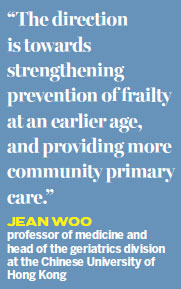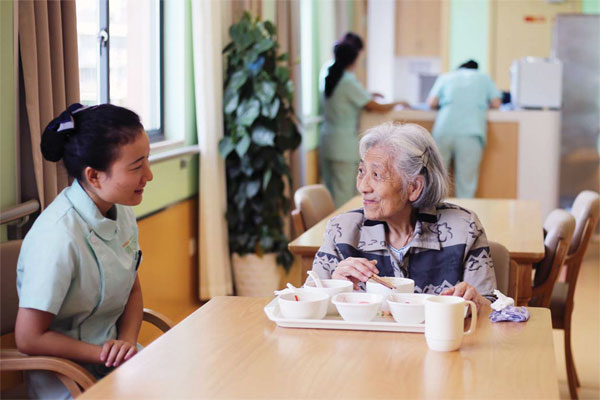Tapping into the business of the elderly
Updated: 2016-10-21 07:13
By Carmen Ho(China Daily Europe)
|
|||||||||
Far from being a heavy burden, fast-growing populations of seniors across Asia offer ways to profit while serving a valuable segment of society
Rapidly aging societies, a trend more pronounced in Asia than any other region, present golden opportunities for companies with vision and flexibility.
In wealthy countries, such as Japan, South Korea and Singapore, elderly people make up 14 percent or more of the population.
Fast-developing countries such as China, Indonesia, Thailand and Vietnam are also aging quickly. The major demographic shift means there will be new needs in these societies.
|
An elderly woman dines at a nursing home in Hangzhou. Fewer people in Asia are relying on their family in old age. In China, only 43 percent of people 65 to 70 years old live with their children, compared with two-thirds of them in the early 1980s. Sun Yidou / For China Daily |
Though often seen as a problem, aging populations offer tremendous opportunities for businesses.
"Many Asian countries are struggling to cope with the consequences of population aging. The direction is towards strengthening prevention of frailty at an earlier age, and providing more community primary care," says Jean Woo, professor of medicine and head of the geriatrics division at the Chinese University of Hong Kong.
"There are many business opportunities if businesses do market research on what population needs are, in terms of providing innovative services as well as products for reablement," says Woo, who is also the director of the CUHK Jockey Club Institute of Ageing.
Reablement services help the elderly regain confidence and the skills they may have lost because of poor health, disability or time spent in hospital.
One obvious sector with great business potential is healthcare. Advances in science and healthcare have extended global life expectancy. The question is how to ensure healthy and productive aging.
Traditionally, societies have taken a hospital-centric approach to deal with health problems related to aging, such as chronic diseases and dementia. This approach has placed huge pressure on hospitals in terms of inpatient care capacity.
Weak primary-care systems are unprepared to manage the increasing influx of elderly patients with chronic illnesses, which also reduces the sustainability of public health financing.
Healthcare providers can be improved to deliver better services and enable better prevention of diseases. Quality long-term care providers and home-based care systems are especially lacking in most countries.
Governments will need help from the private sector to meet increasing demand. Pharmaceuticals, caregivers, nursing homes and even education are all areas with great potential for innovation and investment.
"We need more people trained in the medical fields. But there's also a switch towards self-management, trying to educate people better so that we're all more aware of healthcare and health conditions, because part of prevention and management is not just in the hands of doctors and nurses but also in the community's hands," says Nancy Morrow-Howell, director of the Harvey A Friedman Center for Aging at Washington University in St Louis, in the United States.
"We're talking about better end-of-life care. Many people don't want to live a long time in a real medical-intense situation, so we're trying to expand hospice care so that people can die in a more dignified way."
Part of the solution to having a better aging population, Morrow-Howell added, is "preventing and managing", and then "have the dying process more dignified and in the control of people rather than in the emergency room".
In China, the healthcare sector has seen rapid growth in a catch-up race against the aging trend, though it remains far from mature. China has more than 200 million people older than 60, which is about 15 percent of the country's 1.4 billion population, and it will double in the next 30 years.

In addition to massive new markets and increased consumption of products and services for elderly people, China's aging population could also bring new opportunities in employment.
China has already taken steps to attract young immigrant workers and encourage more women to join the workforce, especially after childbirth. Other Asian countries will need to tap these resources as well to maintain productivity.
As more and more people work into their 70s, companies might have to implement flexible work options and transform workplace structures to meet the needs of older workers.
At the same time, fewer people are following the tradition of relying on their family in old age. In China, for example, only 43 percent of people aged 65 to 70 live with their children, compared with two-thirds in the early 1980s. In South Korea, it is less than 30 percent.
"There are many opportunities and they will keep growing. The private sector has an important role to play," says Christine Kwan, a social scientist and research assistant professor at the Sau Po Centre on Ageing at the University of Hong Kong.
"As entrepreneurs and investors start or expand their businesses, they should develop creative and sustainable ways to make good use of the aging population."
Kwan adds that businesses should make use of older people's strengths and characteristics, such as "their great wisdom, extended social networks, knowledge about history and culture of the cities, and willingness to mentor younger generations".
To do this, businesses need to start monitoring the age profile of their employees to identify problem areas such as age bias. The lack of older employees in certain departments or positions might indicate bias in the recruitment process or in training and development.
Awareness campaigns could promote an age-friendly culture and an inclusive workplace environment, as well as promote well-being to ensure that older employees remain active, healthy and productive.
Companies could also establish alumni networks for retired employees to keep them involved and make continuous use of their experience and knowledge.
Flexible work arrangements would enable companies to hire and retain older workers who may no longer be interested in a high-pressure career but can still provide valuable contributions to the business.
"It sounds impossible but I think it has to happen eventually," says Washington University's Morrow-Howell. "We invented 9-5 (working hours). Our current structures are invented by us and some of them are quite new in human history. We will have to transform these things."
She gives an example of workers not having enough leisure time to focus on their families.
"So let's reinvent work - make work more flexible for everybody so you can go in and out, care for kids, care for parents, have lifelong learning and pursue other interests."
Many experts believe that older workers are a critical resource for businesses.
"Employing elderly people to serve elderly customers is a smart way to do business because older employees will have the empathy for these customers," says the university's Woo.
This has great implications not only in the service sector but also in terms of innovation, research product development.
Kwan, from the University of Hong Kong, says that older people constitute an important market.
"Tailoring businesses to suit older people's tastes and meet their needs would be the direction. This can apply to all areas of life such as self-care and caregiving, healthcare, recreation and entertainment, education, home, tourism, city design and so on."
For China Daily
(China Daily European Weekly 10/21/2016 page29)
Today's Top News
EU leaders mull new trade rules
English cities hope to woo Chinese investment
UK's May tries to reassure EU on Brexit
Lawmakers stage walkout to protest anti-China acts
Syrian army declares 3-day truce in Aleppo
BBC report on Terracotta Warriors refuted
Iraqi forces recapture more villages around Mosul
Greeks rally against labor reforms
Hot Topics
Lunar probe , China growth forecasts, Emission rules get tougher, China seen through 'colored lens', International board,
Editor's Picks

|

|

|

|

|

|








